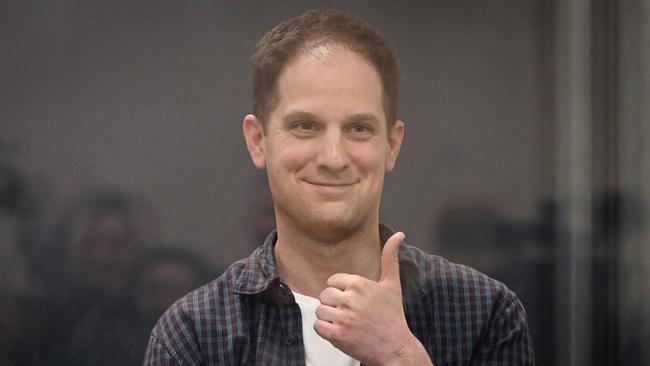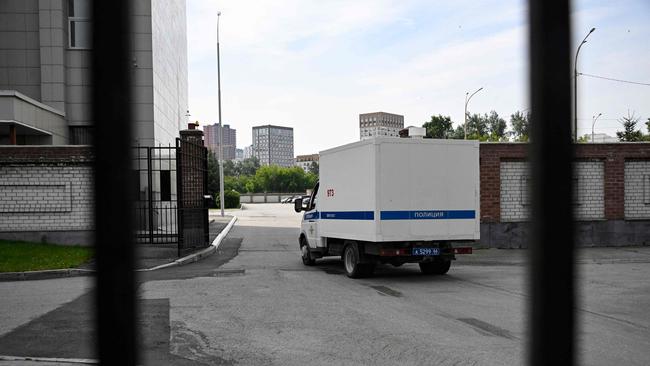For years, Evan Gershkovich saw those he knew convicted and imprisoned in Russia. Now it has happened to him
Falsely accused Wall Street Journal reporter was sentenced to 16 years after a trial denounced as a sham.
Evan Gershkovich thrived while reporting on Russia. He camped in a forest for days to cover wildfires that were ravaging Siberia, he delved into the opaque world of Vladimir Putin’s wartime decision-making and he watched as dissidents and journalists were increasingly jailed.
Writing on Russia, he tweeted in July 2022 that it had become “a regular practice of watching people you know get locked away for years”.
On Friday, it happened to him.
Evan, falsely accused of espionage, was convicted by a Yekaterinburg court after a brief closed-door trial that the US government has condemned as a sham and sentenced to 16 years in a high-security penal colony.
It was another blow for the gregarious, energetic, ever-smiling 32-year-old who has devoted much of his career to telling the story of Russia – and has spent more than a year in Russian prisons since he was detained by the security services in March 2023.
Evan moved to Moscow in 2017 and threw himself into life in the Russian capital, where he joined broomball and soccer leagues and cycled with friends on a used Soviet-era single-speed bike.
Based in London after the Russian invasion of Ukraine, Evan made regular trips back to Russia to report and write stories. In the newsroom, where I met him, he was a constant fount of chatter about Russia – about its politics, about the changes he witnessed during his visits and about the craft of reporting on the country from afar. Now, instead of writing the news, he has become a global news story of his own — his name popping up on the US presidential campaign trail and at a United Nations Security Council meeting.
Evan was arrested in a restaurant while on a reporting trip for The Wall Street Journal and shipped to Moscow’s Lefortovo prison, where he was locked in a cell for 23 hours a day for almost 15 months. He was recently moved to Yekaterinburg for the trial. His ability to communicate with the outside world has been extremely limited. He meets periodically with his lawyers and occasionally the US ambassador, while friends and family reach him through letters written in or translated into Russian. He scrawls replies by hand on plain white paper, often peppered with jokes and updates on the books he has devoured.

Public glimpses have only come from court hearings that happened every month or two, where Evan appeared, standing in a cage, rocking back and forth on his feet while occasionally grinning at photographers. In April, he formed his hands in a heart shape. He seemed to wipe away a tear after sharing a laugh with his lawyer.
His parents, Ella Milman and Mikhail Gershkovich, write to him often. They send him updates on life, and he implores them to stay upbeat. The pair flew to Moscow several times for hearings; in one last year, Ella was able to talk with him for a few minutes through his cage’s glass wall.
“It was just like, I forgot where I was,” she told the Journal podcast. “We discussed a lot of stuff in that short period of time, how I’m still being his mother in his letters, and how happy he was to see us being strong,” she said. “He smiled.”
The legions of friends he has made around the world – from college, from journalism, from life in Moscow – send him pictures and dispatches about new dramas in their lives. They host dinners in his honour, remembering when he used to grill for them or cook them one of his mother’s Russian dishes.
On June 26, Evan appeared again, this time in a courtroom in Yekaterinburg, for his trial. His head was shaved on the orders of prison authorities. His father and some colleagues shaved their heads in solidarity. From Yekaterinburg, Evan will probably be moved to a prison in Russia’s sprawling system of penal colonies.
Evan’s interest in Russia was seeded by his parents, who fled the Soviet Union to the US in 1979. They settled in New Jersey, giving birth first to a daughter, Danielle, and then Evan in October 1991, two months before the Soviet Union dissolved. Evan was immersed in his parents’ culture. The family spoke Russian, ate Russian food and followed his mother’s Russian superstitions, with no whistling in the house and no setting keys on the table.
A soccer star in high school at Princeton’s public schools, Evan studied philosophy at Bowdoin College in Maine and then moved to New York after a year in Thailand. He lived in a rowdy apartment with college friends who he took on bike rides to the Russian enclave of Brighton Beach in Brooklyn, where he showed off his Russian with waiters, ordering vodka by the boardwalk. After a time working as a line chef, he pushed his way into journalism and landed a job as a news assistant at the New York Times.

Then in 2017, Evan took a career risk: He left his job at the New York Times and moved to Moscow to work at the Moscow Times, a scrappy English-language outlet with a history of nurturing talented Russia correspondents.
He was comfortable in New York, but he felt the pull of Russia – a place he’d visited just once but fascinated him. He believed his Russian-language skills and knowledge of the culture put him in a unique position to explain Russia to the outside world, his friend and housemate Jeremy Berke says. “He felt like this was a calling – he was compelled,” Berke said.
He quickly settled in.
Evan adopted the Russian name Vanya rather than Evan and formed a tight-knit group of journalists and expat friends. They spent holidays at lake houses, sat in Moscow’s saunas, known as banyas, and watched and played sports together.
“Summer evenings were often spent dancing at the hipster bars in Moscow,” says Jago Leckie, another friend. Evan had an apartment he loved with herringbone wood floors; his friends all pitched in to get him a colourful rug.
At work, Evan learned about the country, covering everything from oligarch wealth to the economy to climate change. He moved to French wire service Agence France-Presse in 2020. When the Journal advertised a Moscow reporting job the next year, he applied and started in early 2022.
Within weeks, Russia invaded Ukraine. Amid the crush of news, Evan glided into place, normally a tough feat at a new paper in a new city. Bounding around the London newsroom in New Balance sneakers, he had an infectious smile and made friends quickly. He and I became friends and bantered in pubs and over WhatsApp about stories, reporters and editors. He once watched my two cats when I was away, which resulted in one cat breaking into a bucket of food and another locking itself in a room. When I mentioned this, he responded with a quip that referenced Hitchhiker’s Guide to the Galaxy, denying any fault.
He joined a soccer team filled with journalists who play on Wednesday nights, and jelled with the players. One took him to two Arsenal games – his favourite team. He organised a team dinner on a Sunday, a first for a group that usually stuck to postgame pints.
Professionally, Evan distinguished himself almost immediately, too – delivering deeply reported stories on the Russian economy, dead Russian soldiers and President Vladimir Putin.
Months after the war began, he started occasional trips back to Russia – eager to shed more light on what was happening in the country.
Just before a March 2023 visit to Russia for the Journal, he met up with his Moscow friend Leckie, who had moved to Britain. It was still cold in Moscow, Evan said. Leckie lent him a heavy mustard-coloured coat.
On March 29, on a reporting assignment in Yekaterinburg – about 1450km east of Moscow – Russian authorities detained him. The next day, photographers snapped photos of him entering a Moscow courthouse, flanked by security personnel, wearing the mustard coat, its hood over his head.
Like family, friends and colleagues around the world, Leckie watched in horror, grasping the severity of the situation. “My heart sank,” he said.
The Wall Street Journal





To join the conversation, please log in. Don't have an account? Register
Join the conversation, you are commenting as Logout